Targeted test preparation tutoring (online or in person) can significantly boost students’ confidence and exam scores. Tutors provide personalised academic support, homework help, and exam strategies to achieve better results.

Understanding Test Preparation Tutoring
Imagine a high school senior preparing for a crucial college entrance exam. She gets one-on-one Test Preparation tutoring, where a tutor guides her through tricky math problems and writing strategies. Tutors like this provide extra academic coaching beyond the classroom, using practice tests and tailored lessons. This tutoring supplements the regular Test Preparation teaching students receive in school, focusing in depth on problem areas. Research finds that high-quality tutoring can dramatically improve learning outcomes. In fact, in the U.S. more than 1.9 million students took the SAT in 2023, illustrating why many families seek expert exam coaching.
- Personalized Support: Tutors adapt lessons to the student’s specific needs, offering focused practice on weak topics and building confidence. This one-on-one attention helps clarify doubts that large classes often overlook.
- Targeted Practice: By using exam-like questions and review sessions, tutors provide dedicated Test Preparation homework help. For example, a tutor might assign practice problems (also called Test Preparation hw help) to reinforce each lesson’s content.
- Flexible Scheduling: Students and families can connect with a Test Preparation tutor online at convenient times. Online sessions allow tutoring from home without travel, fitting busy schedules and offering access to tutors anywhere.
- Expert Strategies: Experienced tutors share proven test-taking techniques, time-management tips, and study methods. Learning these strategies often translates into higher exam scores.
- Demonstrable Gains: Studies consistently find strong results from tutoring. For example, one education review noted that students in tutoring programs could gain anywhere from half a year to more than a full year of learning in just one academic year.
To visualize how these elements come together to boost student performance, let’s look at the core benefits of a structured tutoring program.
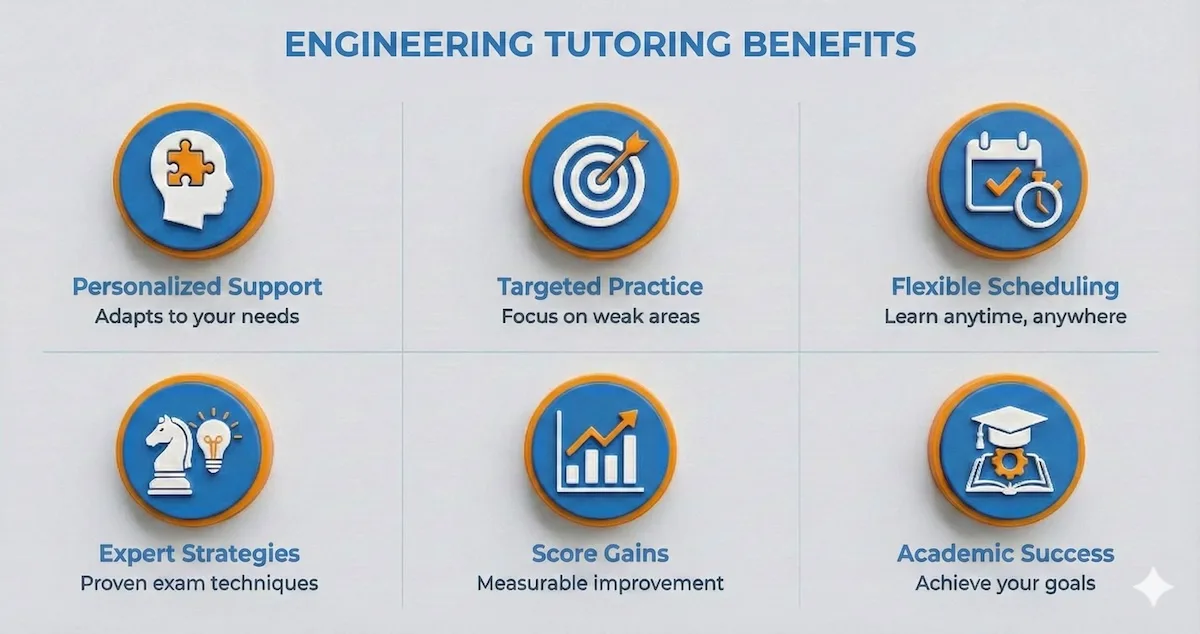
Visualizing how personalized test preparation strategies translate directly into higher exam confidence and scores.
As you can see, the combination of personalized support and targeted practice creates a measurable impact on exam results.
Online vs In-Person Tutoring
Historically, tutoring was primarily face-to-face, but Test Preparation tutoring online has surged. Market data show that traditional in-person tutoring still led about 76.5% of the private tutoring market in 2024. In-person sessions provide direct interaction, which many families value. However, online tutoring offers new advantages: an industry report found over 12 million Indian students joined online tutoring programs in 2023, reflecting a global shift. Parents and students often cite the affordability and convenience of online lessons. Hybrid models, blending in-person and online teaching, have also grown rapidly – one study reported a 35% rise in hybrid tutoring enrollments in 2023. Many tutoring services now even use the phrase “Test Preparation tutoring online” in their ads to highlight virtual options.
Choosing between these two formats can be difficult. The comparison table below breaks down the key differences in cost, flexibility, and interaction to help you decide.
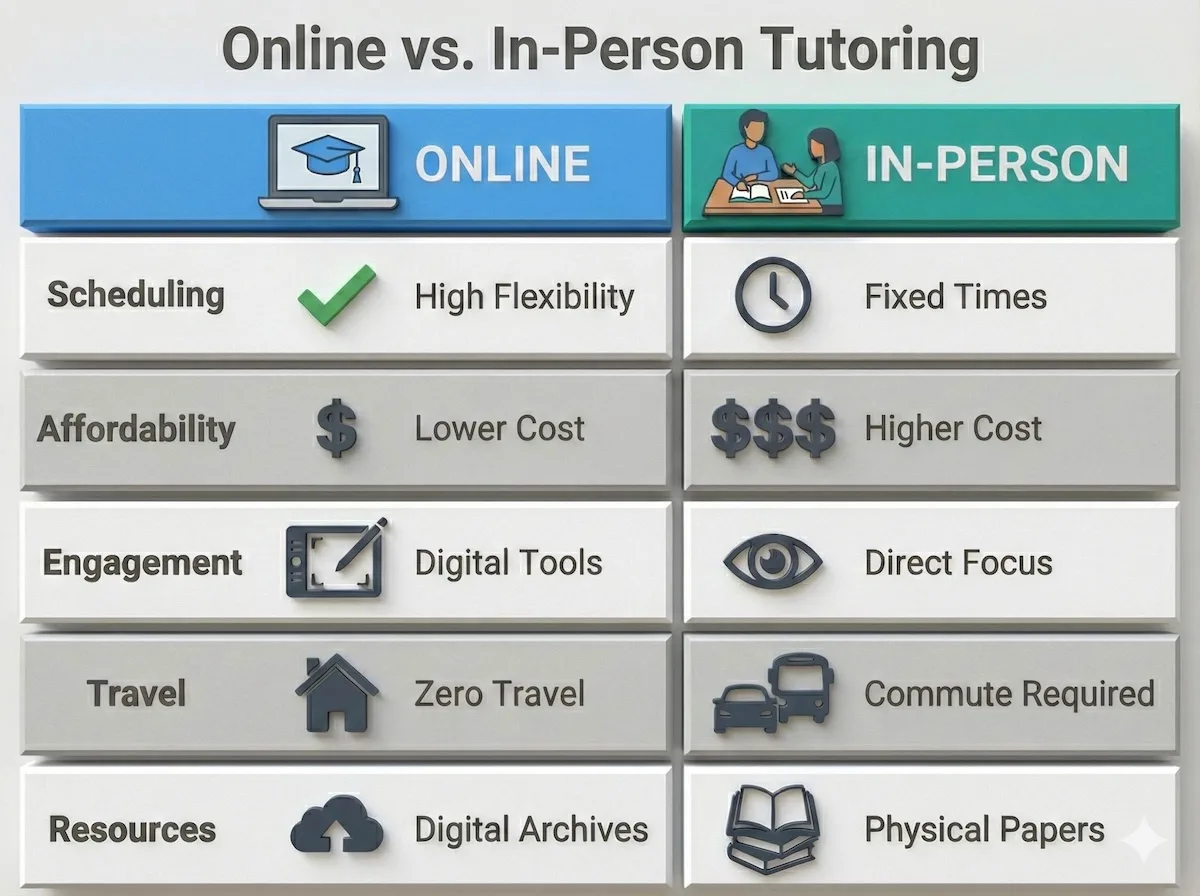
Compare the features of online and in-person tutoring to choose the learning mode that fits your schedule and budget.
While online tutoring offers superior flexibility and lower costs, in-person sessions may still be preferable for students who need a distraction-free physical environment.
- Online Advantages: Students can easily hire tutors from anywhere, expanding their choices. Virtual sessions often cost less than in-person lessons. Digital tools (videos, interactive whiteboards, quizzes) make learning engaging. This accessibility is why many platforms advertise remote Test Preparation tutor online sessions.
- In-Person Advantages: Sitting side-by-side with a tutor can help maintain focus. Offline tutoring centers may use paper materials and provide a distraction-free environment. In regions with strong tutoring cultures, many parents still prefer face-to-face exam coaching.
- Hybrid Approach: Combining both methods lets students meet tutors online for convenience and occasionally in person for intensive review. This approach gained popularity quickly: for instance, hybrid tutoring enrollments jumped about 35% in the U.S. during 2023.
Regional Differences: USA, UK, and Gulf
United States
In the U.S., many high schoolers use tutors for college entrance exams and advanced courses. Over 1.9 million U.S. students took the SAT in 2023, and more than 2 million took the ACT. With stakes so high, parents often hire tutors to help. A survey found that by 2022, over 80% of U.S. schools offered some form of tutoring, though only about 11% of students accessed intensive programs. Test preparation tutors in America often focus on math and science or verbal skills needed for tests. For example, a recent study showed an AI-driven online math tutor improved student math scores by about 9 percentage points. These trends reflect the demand for personalized exam help beyond what school classes provide.
United Kingdom
UK students face national exams like GCSEs (at age 16) and A-Levels (at 18). Private tutoring is common: one report found nearly 30% of UK pupils aged 11–16 had received private tuition. Many families pay for tutors to improve grades in key subjects and boost university prospects. British tutors often run small group revision classes or individual sessions focusing on past exam papers. Tutors may advertise services like Test Preparation homework help or Test Preparation assignment help for core courses. Even with some school tutoring initiatives, parents frequently turn to private tutors to supplement classroom learning and target specific exam preparation.
Gulf Region (Middle East)
In Gulf countries (e.g. UAE, Saudi Arabia), students often follow British, American, or IB curricula, so exams like GCSEs, A-Levels, SATs, and IB finals are common. The region has a very young population – around 34% of the UAE and 50% of Saudi Arabia are under age 25 – and governments are investing heavily in education. For instance, the Saudi online tutoring market was about $0.09 billion in 2024 and is projected to reach $0.30 billion by 2033. Overall, Middle East & Africa tutoring was estimated at $22.0 billion in 2024. Many Gulf families hire tutors in math and English, or for international exams. Tutors there often must navigate multiple exam systems. The high demand has led to many local tutoring centers and online services targeting expat and local students alike.
Hiring a Test Preparation Tutor
These regional trends contribute to a massive global shift in education. The data highlights just how rapidly families are adopting hybrid and online learning models.
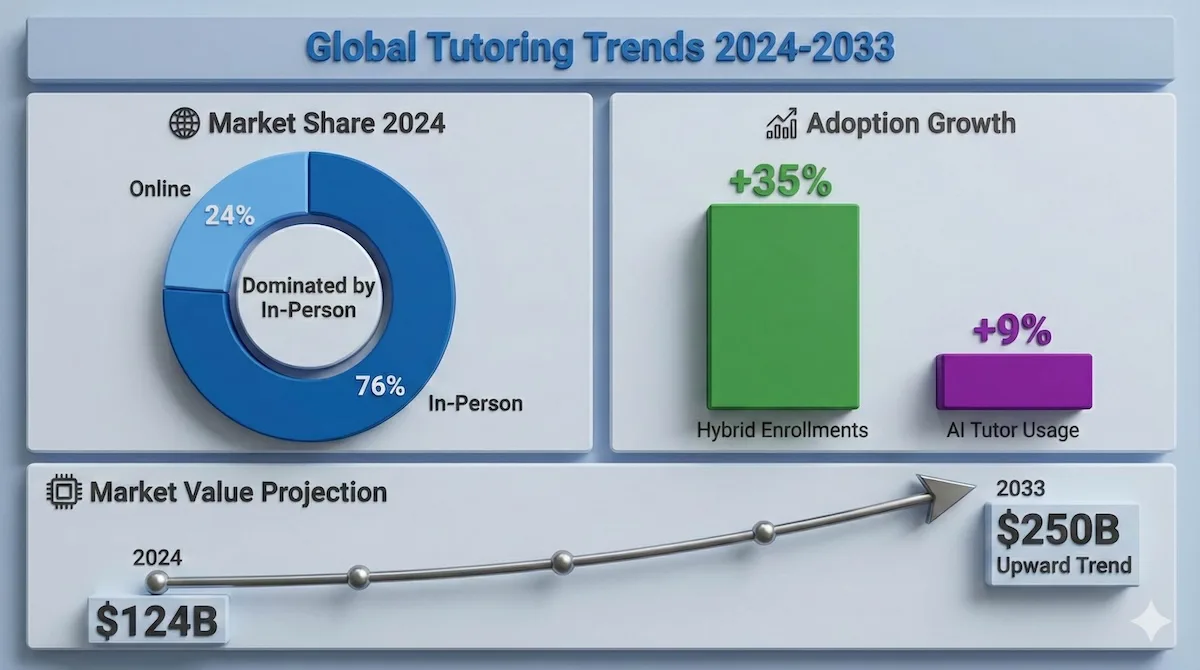
Recent industry data highlights the rapid rise of hybrid learning models and the projected doubling of the tutoring market.
With the market projected to double by 2033, finding a qualified tutor is becoming both easier and more competitive.
Students or parents looking to improve exam results often search to “hire a Test Preparation tutor.” There are many ways to find one: tutoring agencies, online marketplaces, or local adverts. Look for a tutor with relevant experience (for example, a math degree for SAT math tutoring). You can often filter online listings by subject and test (e.g. SAT, GCSE, AP). It’s smart to have a trial lesson to ensure a good fit. Rates vary by location and subject – many U.S. tutors charge around $20–$40 per hour for common subjects. Always clarify the schedule and goals (which exams or topics to cover) before committing.
- Search on reputable tutoring platforms or local education centers. Compare tutor profiles, subjects offered, and reviews.
- Check credentials and experience. A good test prep tutor often has strong subject knowledge or test-taking experience.
- Request a trial session to see if the tutor’s teaching style works well. Use this time to set goals.
- Discuss scheduling and cost upfront. Agree on how many sessions and what materials will be used.
Navigating the hiring process can feel overwhelming. Follow this simple step-by-step flowchart to ensure you vet candidates thoroughly.
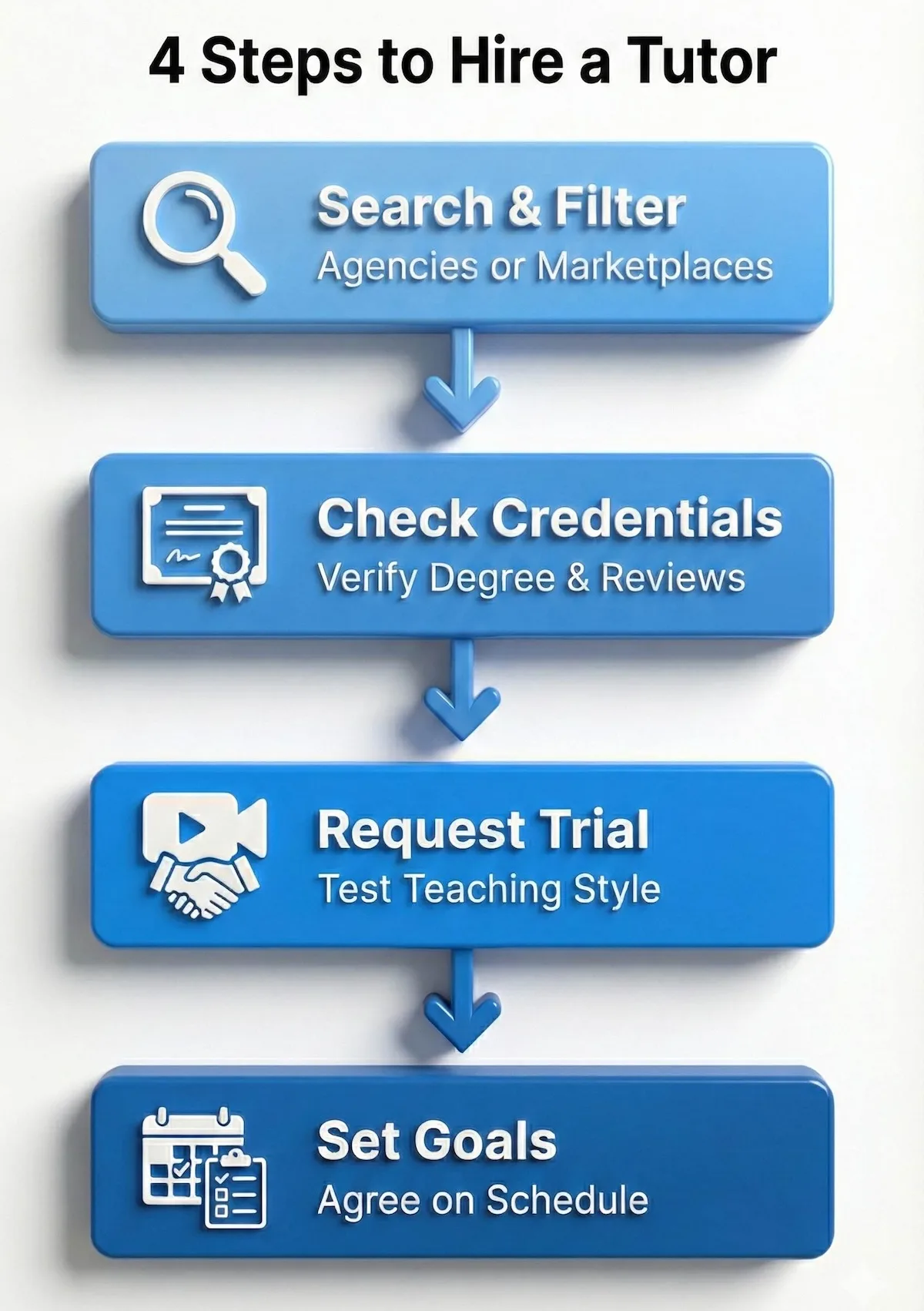
Follow this four-step process to ensure you find a qualified tutor who matches your specific learning goals.
By strictly following the ‘Trial Session’ and ‘Goal Setting’ steps, you avoid the common pitfall of hiring a tutor whose teaching style doesn’t match your learning needs.
Homework and Assignment Support
Test preparation tutors often also provide homework help for exam topics. For example, after teaching a concept, a tutor might give the student extra practice problems to complete at home. Tutors often assign practice exams so students can track their progress. Tools like the Test Grade Calculator help students quickly compute scores and identify which areas need more review, making practice sessions more efficient. In the next session the tutor reviews those problems together, correcting mistakes and reinforcing concepts. If a student has a relevant project or assignment (like an essay or lab report), a test prep tutor can guide them through it. Tutors often advertise services as Test Preparation homework help or Test Preparation assignment help. In all cases, this support makes sure that learning continues between sessions and that students practice applying what they’ve studied.
Effective tutoring isn’t just about the hour spent on a video call; it’s a continuous cycle of learning. Here is how the support loop reinforces new concepts.
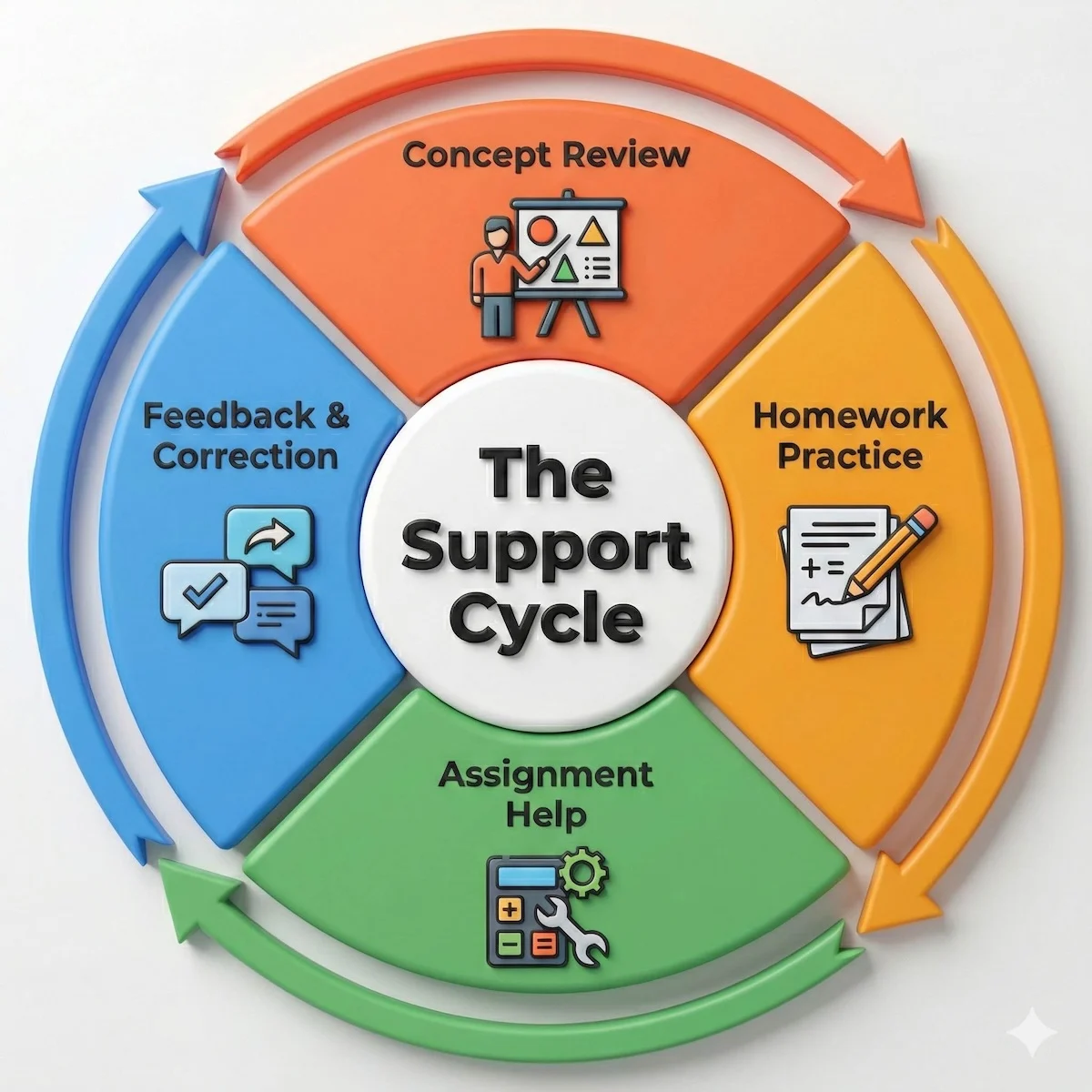
Effective tutoring creates a continuous learning loop where homework and assignment support reinforce concepts learned in sessions.
This cycle ensures that feedback from homework is immediately applied to the next concept review, preventing knowledge gaps from forming.
Industry Trends and Future Outlook
The global demand for test prep tutoring is rising. One industry report estimated the worldwide private tutoring market at about $124.5 billion in 2024, with projections to nearly double by 2033. Analysts attribute this growth to fierce competition in STEM fields and standardized tests, which drive families to invest in extra help. Technology is a big part of the future: AI-powered tutoring tools and apps are making personalized learning more scalable. For example, studies on AI tutors show significant score improvements. The COVID-19 pandemic accelerated online learning adoption, and many students now prefer the flexibility of virtual sessions. Governments have also taken notice: for instance, U.S. pandemic relief funds included around $4 billion for tutoring programs. Overall, test preparation services are expected to expand further, with more hybrid and tech-enabled models emerging worldwide.
FAQs
Q: What is test preparation tutoring? Personalized instruction focused on helping students review subject content and practice strategies for specific exams.
Q: How does online test preparation tutoring work? Students meet tutors via video chat or online platforms, using digital tools to review content and practice problems remotely.
Q: What is the difference between a test preparation tutor and a test preparation teacher? A tutor teaches students one-on-one or in a small group for individualized attention, while a teacher leads an entire class following the school curriculum.
Q: Why hire a test preparation tutor? A tutor provides targeted guidance, extra practice, and exam strategies that can improve confidence and test scores.
Q: What subjects and exams can a test preparation tutor help with? Tutors can assist with any academic subject or standardized test (math, science, languages, SAT, ACT, GCSE, A-Levels, etc.) relevant to the student’s needs.
Q: What are test preparation homework and assignment help? It means a tutor provides extra practice problems and assists with projects related to exam topics, reinforcing the material between lessons.
Conclusion
Effective test preparation can make the difference between average and outstanding scores. Across the USA, UK, Gulf, and elsewhere, tutoring fills gaps that regular classes might miss. By offering personalized instruction, extra practice, and targeted strategies, a dedicated tutor can boost a student’s confidence and performance. For any student aiming higher, it can be wise to hire a Test Preparation tutor. The right tutor – whether in-person or online – helps turn study time into measurable improvements.
Related Subject are below:
11+ (11 Plus Examination)
A Level
ACCA (Association of Chartered Certified Accountants)
ACT
AP
Aptis (English Language Test)
ARRT (American Registry Of Radiologic Technologists)
Bar Exam Preparation
Biology Abitur
BMAT (Biomedical Admission Test)
BTEC (Business and Technology Education Council)
BTEC Applied Science
Cambridge (TKT) Teaching Knowledge Test
Cambridge Business English
Cambridge Checkpoint
Cambridge General English Test
Cambridge IGCSE
Cambridge Technicals
Cambridge YLE (Young Learners) Exam
CAPE Biology
CAT (Classics Aptitude Test)
CCNA (Cisco Certified Network Associate)
CELPIP
CEM (Centre for Evaluation and Monitoring)
CFA (Chartered Financial Analyst)
Chemistry Abitur
CIM (Chartered Institute of Marketing)
CIMA (Chartered Institute of Management Accountants)
CIPS (Chartered Institute of Procurement & Supply)
CLEP
CPA (Certified Public Accountant AUD FAR REG BAR ISC TCP)
Dental Admission Test (DAT)
Design For Manufacturing & Assembly (DFM DFA & DFMA)
Edexcel
ELAT (English Literature Admission Test)
Electromechanical Energy Conversion
EmSAT
ENGAA (Engineering Admissions Assessment)
ESAT (Engineering Scholastic Aptitude Test)
FE (Fundamentals of Engineering)
FRM (Financial Risk Manager) Exam
FS (Fundamentals Of Surveying)
GAMSAT (Graduate Medical Admissions Test)
GCSE
GMAT
GRE
HAT (History Aptitude Tests)
HKDSE
HSC
HSPT
HSPT Math
IB
IELTS
IMAT
Irish Leaving Certificate
LNAT (Law National Aptitude Test)
LSAT
MAT (Mathematics Aptitude Test)
Mathematics CAPE
MCAT
Medical Entrance Exam
MLAT (Modern Languages Test)
MRCP(UK)
MRCS
NAPLAN (National Assessment Program – Literacy and Numeracy)
NAPLEX (North American Pharmacist Licensure Examination)
NCEA
NCLEX-RN
NREMT
NSAA (National Standard Achievement Award)
O-Level
OET (Occupational English Test)
OLAT (Oriental Languages Aptitude Test)
Optometry Admission Test (OAT)
Oxbridge
PAT (Physics Aptitude Test)
PE (Principles and Practice of Engineering)
PS (Principles And Practice Of Surveying) Exam
PSAT NMSQT
PTE (Pearson Test of English)
SACE
SAT
Scottish Advanced Highers
Scottish Highers
Scottish National 5
STEP (Sixth Term Examination Paper)
TestDaF
TMUA (Test of Mathematics for University Admission)
TOEFL
TOEIC
TSA (Thinking Skills Assessment)
UCAT (University Clinical Aptitude Test)
USMLE
VCE
WACE
******************************
This article provides general educational guidance only. It is NOT official exam policy, professional academic advice, or guaranteed results. Always verify information with your school, official exam boards (College Board, Cambridge, IB), or qualified professionals before making decisions. Read Full Policies & Disclaimer , Contact Us To Report An Error

